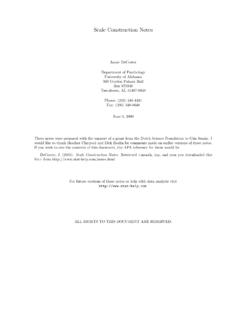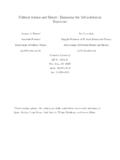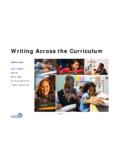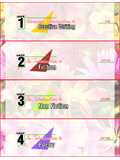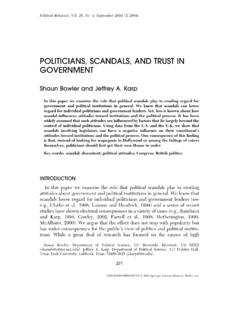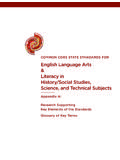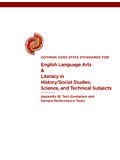Transcription of Guide to writing academic papers - University of …
1 Guide to writing academic papers School of Management political Science University of Tampere Autumn 2013 Contents 1. Introduction 2. Types of academic paper x Literature review x Learning diary (Lecture diary) x Essay x Literature essay as compensatory work x Seminar presentation x Thesis 3. Structure and form of academic papers 4. Layout of academic papers 5. References and citation practices 6. Bibliography ANNEXES: Annex 1: Model for cover sheet Annex 2: Model for bibliography format Annex 3: Model for abstract page of Master s thesisGuide to writing academic papers /Politics 1 1. Introduction This booklet is a Guide to writing academic papers in political Science and International Relations / Degree Programme in Politics at the School of Management.
2 It is intended as a resource for both degree students and exchange students. During your studies you are required to submit many kinds of written work, such as learning diaries, literature reviews, essays and theses. These various kinds of academic writing assignment have different purposes, aims and forms. The guidelines provided in this booklet are intended to simplify the writing process and unify the format of written presentations. It is recommended that you read the whole booklet through to familiarize yourself with its contents and, later on, refer back to it when writing academic papers . Individual professors and teachers can issue their own instructions for papers submitted in their courses.
3 Always make sure to check and comply with the instructions given on a course (even when they differ from those in this booklet). Each academic paper (including learning diaries) is a totality that should stand on its own. The starting point for preparing an academic paper should be what you want to say in it. In different kinds of academic paper the focus varies. For example, in a learning diary the focal point is what you have learned during the course, and this central theme should run though the whole paper and provide its structure. Formulating the research question(s) and deciding on the research method and material are the most important steps in any research process, and they are also the most difficult.
4 Research is a creative process, which can generate great satisfaction when you are able to successfully complete these steps. How the work and its structure start to come together is largely dependent on the type of paper you are writing and the research questions or problem you set out to solve. Research can be either theory driven (deductive) or empirical (inductive), which also has implications for how the paper and research process proceed. This dichotomy, of course, is misleading in that every research process contains both theoretical and empirical elements from the very beginning. Even the most empirical research has a theoretical background that the research problem relies on, and even the most purely theoretical research includes some kind of research material.
5 writing an essay or a thesis is a Guide to writing academic papers /Politics 2 continuous process of cross-fertilization between empirical data and theoretical understanding. As such, a research report is constructed piece by piece. The end result should be readable, logical and clear, and it should answer the research question(s) convincingly. The common structure for academic papers is the following: x Research task x Theory and review of relevant literature x Research problem and questions x Hypotheses/assumptions/arguments x Research material and methods x Results/analysis x Conclusions/discussion It should be remembered that the decisions made about the structure of the paper in the beginning are not definitive but can change during the research and writing process.
6 Sometimes the initial problem itself can change during the research process when something completely new is uncovered from the empirical material. It is good to write multiple drafts and not to place too great an importance on the early ones. Theses often follow the above structure and it can be very helpful for other academic papers to do so as well. An essay is thesis-like (but not a mini-thesis!) in that it reflects on a specific problem from a particular point of view and uses multiple academic sources and references. An essay should also start with the research task and problem, introduce the material, discuss it and end with conclusions. A book review can follow the structure of the book and a literature review should be structured around the common themes of the books included.
7 A learning diary should be structured around your perception of what you have learned during a course. The aim of any research and academic writing is to increase understanding and knowledge of the phenomena it focuses on. An academic paper is primarily addressed to the academic community, which does not, however, mean that it should not be written in a style that is comprehensible to the general public. Research should always be reported in intelligible language. It is important to take note of the following: Guide to writing academic papers /Politics 3 x Textual clarity In any kind of written presentation, you should aim for textual clarity and readability. Careless use of language can distort your ideas and arguments and at worst can lead to serious misunderstandings.
8 X Grammar and spelling By following the rules of grammar and spelling accurately you can help the reader to understand your texts. Text that is full of mistakes is tiring to read and hardly inspires confidence in the validity of research itself. Make sure to use the spell-check and grammar-check features in your text-processing software and to proofread your academic papers before submitting them. x Conceptual clarity Concepts are central to academic writing and should be used logically. academic concepts are meant to be exact and economic; they can function as a shorthand in specific contexts and thus save space when used correctly. Different schools of thought or subfields of political science can have different understandings of what a specific concept means; thus, it is important to define the central concepts you are using.
9 X Time By its nature, academic writing takes time. Clear and readable text arises from the lucidity of your thoughts, and to achieve clarity in thinking is time-consuming. It is advisable to write multiple drafts, as each draft usually helps to clarify your thoughts on the subject in question. x Sources Each academic paper you submit should have proper references and citations and a complete bibliography (see chapter 5 for guidance on this). Failure to report sources leads to unacknowledged quotations or citations, which can amount to plagiarism. Guide to writing academic papers /Politics 4 2. Types of academic paper Literature review A literature review is a presentation which summarizes the essential contents of one or several monographs or scientific articles.
10 In a literature review, you are expected to introduce the author s/authors key arguments and present the results of her/their analysis in a concise form. It is important to note that a series of direct quotations from the literature under inspection does not in itself constitute a literature review. When working on a literature review, you should always keep in mind its function. The purpose of a literature review is to analyze the essential characteristics of a particular text or texts. This means that you should pay attention to the structure and the central themes of the text(s) as well as to the arguments presented by its author(s). In this sense, a literature review could be thought of as a full-figure photograph of the text(s).



